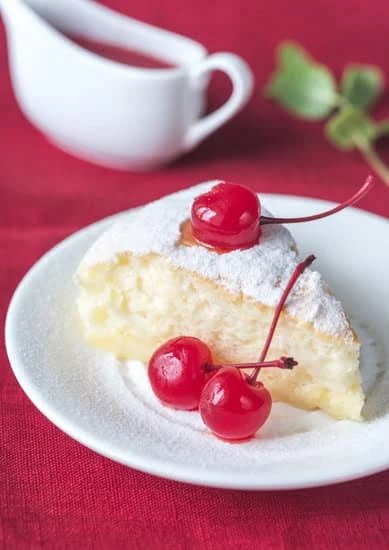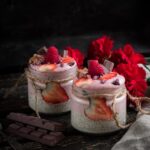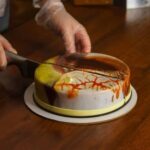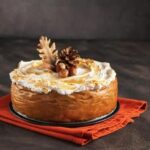Whether it’s for a birthday, anniversary, or any special celebration, knowing how to decorate a cake with whipped cream frosting can take your homemade desserts to the next level. Whipped cream frosting has gained popularity for its light and airy texture, making it a delightful alternative to buttercream or fondant. The appeal of decorating cakes with whipped cream lies in its versatility and ability to create beautiful designs that are both delicious and visually stunning.
When it comes to choosing the right cake for decorating with whipped cream frosting, not all types of cakes are created equal. It is important to consider the best options that provide a sturdy base to support the delicate nature of whipped cream. From classic sponge cakes to sturdy pound cakes, selecting the right base will ensure that your decorated creation holds up beautifully.
In this article, we will explore the step-by-step process of preparing whipped cream for decorating, as well as the essential tools and techniques needed to create intricate designs. We will also discuss how to add color and flavor to whipped cream frosting for a personalized touch, as well as highlight the simplicity of adorning cakes with fresh fruits and berries using whipped cream frosting.
Whether you’re a beginner or seasoned baker, mastering the art of decorating with whipped cream will elevate your baking skills and impress your guests with professional-looking creations. So let’s dive in and discover how you can unleash your creativity through cake decorating with whipped cream frosting.
Choosing the Right Cake
When it comes to decorating a cake with whipped cream frosting, choosing the right type of cake is crucial. The best types of cakes to use with whipped cream frosting are those that are sturdy and can hold up well under the weight of the frosting.
A light and airy sponge cake or a dense pound cake are excellent choices for pairing with whipped cream frosting. These types of cakes provide a stable base for the delicate texture of the whipped cream, ensuring that your decorated masterpiece stays intact.
In addition to choosing the right type of cake, it’s also important to ensure that the cake layers are level and even. Uneven layers can result in a lopsided or unstable cake, making it difficult to achieve a beautiful finished product.
Using a sharp serrated knife or a cake leveler, carefully trim any domed tops from your cakes to create an even surface for frosting. This simple step will not only improve the overall look of your cake but also make it easier to decorate with whipped cream frosting.
To prevent any potential mishaps, it’s also helpful to place a thin layer of frosting on the bottom layer of the cake before adding more layers on top. This serves as a “glue” that helps hold the layers together and prevents them from sliding around while you decorate. Now that you’ve selected the perfect type of cake and prepared your layers, you’re ready to move on to making and stabilizing your whipped cream for decorating.
Subsection: Preparing Your Cake Layers
- Choose sturdy cakes like sponge or pound cakes
- Trim any domed tops using a serrated knife or leveler
- Add a thin layer of frosting between cake layers for stability
Preparing the Whipped Cream
Whipped cream frosting is a popular choice for decorating cakes due to its light and airy texture, making it a versatile option for creating beautiful designs. However, in order to successfully decorate a cake with whipped cream frosting, it is essential to properly prepare and stabilize the whipped cream. This section will provide a step-by-step guide on how to make and stabilize whipped cream for decorating, ensuring that your decorations will hold up and look stunning.
To begin, start with cold heavy whipping cream, which should be at least 36% fat content. Using a metal bowl and whisk attachment for your mixer, chill the bowl and whisk in the freezer for about 15 minutes before starting. This helps to keep the cream cold throughout the whipping process.
Once everything is properly chilled, pour the heavy cream into the cold bowl and beat on medium-high speed until soft peaks form. It’s important not to overbeat the cream at this stage, as it can quickly turn into butter if whipped too much.
After achieving soft peaks, it’s time to sweeten and stabilize the whipped cream. Gradually add powdered sugar and a small amount of vanilla extract while continuing to beat the mixture. To stabilize the whipped cream for decorating purposes, you can also add a small amount of gelatin or cornstarch to help maintain its shape.
Following these steps will result in a perfectly whipped and stabilized cream that is ready for decorating your cake. Using this homemade whipped cream frosting will ensure that your cake not only looks visually appealing but also tastes incredibly delicious.
Decorating Tools and Techniques
Decorating with whipped cream frosting offers a versatile and delicious way to adorn cakes, making them visually stunning and appealing to the taste buds. The key to achieving beautifully decorated cakes with whipped cream frosting lies in the use of the right tools and techniques. By understanding the different piping tips, tools, and methods available, you can create intricate designs and patterns that will elevate your cake decorating game.
Piping Tips
When it comes to decorating with whipped cream frosting, the type of piping tip you use can make a significant difference in the final look of your cake. Large open star tips are perfect for creating rosettes or swirls on top of the cake, while smaller round tips can be used for writing or creating fine details. Additionally, there are specialty tips such as petal tips for making flower designs or leaf tips for adding foliage elements.
Tools
In addition to piping tips, having the right tools on hand is essential for successful cake decorating with whipped cream frosting. A rotating cake stand makes it easier to apply even pressure when piping designs onto the cake. Piping bags and couplers allow you to easily switch between different tips without having to change bags. Offset spatulas are useful for smoothing out the frosting and creating clean edges.
Methods
There are various methods for applying whipped cream frosting onto a cake, each resulting in different textures and effects. From simple flat icing using an offset spatula to more intricate designs created through piping techniques, understanding these methods will help you achieve your desired decorative outcome. Experimenting with different methods will also allow you to discover unique styles that suit your personal preferences.
With the right knowledge of piping tips, tools, and methods for creating beautiful designs with whipped cream frosting, you can take your cake decorating skills to new heights. Whether you’re aiming for a simple yet elegant design or an elaborate masterpiece, mastering these techniques will enable you to showcase your creativity and impress others with your stunning creations.
Adding Color and Flavor
Using Gel Food Coloring
When it comes to adding color to whipped cream frosting, gel food coloring is your best bet. Unlike liquid food coloring, gel coloring won’t water down the whipped cream, ensuring that it maintains its fluffy consistency.
Start by adding a small amount of gel coloring to the whipped cream and slowly mix it in until you achieve the desired hue. Remember that a little goes a long way with gel food coloring, so start with a small amount and gradually add more as needed.
Infusing Flavor
To infuse your whipped cream frosting with flavor, consider adding extracts or natural flavorings such as vanilla, almond, or citrus zest. Simply fold in the desired flavoring after whipping the cream but before adding any color. You can also experiment with other flavor additions like cocoa powder for chocolate-flavored whipped cream or espresso for a coffee-flavored twist.
Natural Coloring and Flavors
For those looking for natural options, consider using fruit purees or powders to both color and flavor your whipped cream frosting. Raspberry puree can add a pink tint and fruity taste while matcha powder can provide a vibrant green color with an earthy undertone. Just be mindful of the moisture content when using fruit purees to avoid compromising the stability of the whipped cream.
By incorporating these tips on adding color and flavor to your whipped cream frosting, you can create visually stunning and delicious cakes that are sure to impress your friends and family. Experiment with different combinations and get creative with your decorations to showcase your unique style and skills in cake decorating with whipped cream frosting.
Decorating With Fresh Fruits and Berries
Fresh fruits and berries are not only delicious additions to a cake but also add a colorful and natural touch to the overall appearance. When using whipped cream frosting, it is essential to choose fruits that complement the flavor and texture of the cake. Strawberries, raspberries, blueberries, and sliced kiwi are popular choices due to their vibrant colors and ability to pair well with the lightness of whipped cream.
To adorn your cake with fresh fruits and berries using whipped cream frosting, consider the following options:
- Sliced Strawberries: Arrange slices of fresh strawberries in concentric circles on top of the cake for a simple yet elegant look. The red color of the strawberries against the white whipped cream creates a visually striking contrast.
- Mixed Berry Border: Create a border around the edge of the cake using a variety of mixed berries such as raspberries, blueberries, and blackberries. This adds a pop of color and freshness to the finished cake.
- Kiwi Accents: Peel and slice kiwi into decorative shapes such as stars or hearts to place strategically on top of the whipped cream frosting for a unique and playful decoration.
It is important to prepare the fruits just before serving to prevent them from releasing excess juices onto the whipped cream frosting. Additionally, gently patting the fruits dry with a paper towel can help minimize any moisture that could potentially affect the stability of the frosting.
Incorporating fresh fruits and berries into your cake decorating with whipped cream frosting not only enhances visual appeal but also introduces delightful bursts of flavor that complement the lightness of this type of frosting. By experimenting with different fruit arrangements, you can create stunning cakes that are both pleasing to look at and delightful to eat.
Creating Elegant Designs
When it comes to decorating a cake with whipped cream frosting, there are endless possibilities for creating elegant designs and patterns. Whether you’re a beginner or a seasoned baker, mastering the art of using whipped cream as a decorating medium can elevate your cakes to a whole new level. Below, you’ll find step-by-step instructions on how to achieve intricate designs and patterns using whipped cream.
First, start by ensuring that your whipped cream is at the right consistency for decorating. It should be firm enough to hold its shape but still smooth and creamy. To achieve this texture, make sure not to over-whip the cream, as it can become grainy and difficult to work with.
Next, fill a piping bag fitted with your desired piping tip – whether it’s a star tip for rosettes, a round tip for borders, or a leaf tip for foliage-like designs. Hold the piping bag at a 90-degree angle to the surface of the cake and apply steady pressure while guiding the tip to create your chosen design. Practice on parchment paper beforehand to get comfortable with controlling the flow of whipped cream.
To create intricate patterns like swirls, scrolls, or lace-like designs, use different piping tips in combination or layering techniques. For example, you can pipe small rosettes around the border of the cake and then connect them with delicate lines or create latticework using crisscrossed lines of whipped cream.
Remember that patience and practice are key when it comes to mastering intricate designs with whipped cream frosting. Don’t be discouraged if your first attempts aren’t perfect – every cake decorator started somewhere. With time and dedication, you’ll be able to create stunning works of edible art using whipped cream as your medium.
| Design | Technique |
|---|---|
| Rosettes | Hold piping bag at 90-degree angle; Apply steady pressure |
| Lace-like designs | Use different piping tips in combination or layering techniques |
| Swirls and scrolls | Pipe small rosettes around border then connect them with delicate lines |
Troubleshooting and Tips for Success
Whipped cream frosting is a delicious and versatile option for decorating cakes, but it can sometimes present challenges for bakers. Understanding common issues and how to troubleshoot them is essential for achieving a stunning, professional-looking cake with whipped cream frosting. Here are some tips to help you navigate potential pitfalls and create a beautiful dessert that will impress your friends and family.
One common issue when decorating a cake with whipped cream frosting is the stability of the whipped cream itself. To ensure that your frosting holds its shape, it’s important to stabilize the whipped cream with gelatin or cornstarch. Adding these stabilizers will prevent the frosting from becoming runny or deflating, especially if you plan to decorate the cake in advance of serving.
Another challenge is achieving the right consistency for piping intricate designs. If the whipped cream is too thin, it may not hold its shape when piped onto the cake. It’s important to beat the whipped cream just until stiff peaks form, being careful not to overmix it. Additionally, making sure that your piping equipment and tips are clean and free of any residual oil or moisture can also contribute to better results.
Additionally, working with whipped cream frosting in warm or humid conditions can pose challenges. If you’re decorating a cake in a warm environment, consider chilling your tools and equipment before use to help maintain the stability of the whipped cream.
It’s also helpful to keep the decorated cake refrigerated until just before serving to prevent any melting or drooping of the frosting. By taking these measures and following these tips, you can overcome common issues and achieve great success when decorating a cake with whipped cream frosting regardless of environmental factors.
Overall, with some thoughtful preparation and attention to detail, you can create a stunning masterpiece using whipped cream frosting on your cakes. Whether it’s stabilizing the whipped cream, achieving the right consistency for piping, or managing environmental factors, mastering these troubleshooting tips will set you up for success in creating beautiful desserts that taste as good as they look.
With practice and patience, you’ll be able to confidently showcase your creativity by adorning your cakes with gorgeous decorations made from whipped cream frosting.
Conclusion
In conclusion, decorating a cake with whipped cream frosting offers a delightful and versatile option for creating stunning designs. From simple swirls to intricate patterns, the possibilities are endless when it comes to using whipped cream as a decorative element. By choosing the right cake base, preparing the whipped cream properly, and utilizing different tools and techniques, anyone can create a beautiful masterpiece that is both delicious and visually appealing.
As highlighted throughout this article, the key to successful cake decorating with whipped cream frosting lies in careful preparation and attention to detail. From stabilizing the whipped cream to selecting the best piping tips and tools, each step plays a crucial role in achieving professional-looking results. Additionally, by adding color and flavor to the whipped cream, individuals can infuse their own personal touch into their cake designs, making each creation unique and tailor-made.
Ultimately, I encourage readers to unleash their creativity and explore the art of decorating cakes with whipped cream frosting. Whether it’s for a special occasion or simply as a creative outlet, this enjoyable pastime allows individuals to showcase their skills while delighting others with delectable confections.
So gather your ingredients, experiment with different designs, and enjoy the process of creating stunning cakes adorned with luscious whipped cream frosting. With practice and perseverance, anyone can master the art of cake decorating with whipped cream frosting and impress friends and family alike with their beautiful creations.
Frequently Asked Questions
How Do You Decorate a Cake With Whipped Cream for Beginners?
Decorating a cake with whipped cream for beginners can be done by ensuring the cream is well-chilled, using a piping bag with different tips to create decorative patterns, and practicing on a flat surface before moving on to the cake.
Can Whipped Cream Be Used for Cake Decorating?
Yes, whipped cream can be used for cake decorating. It is a light and fluffy option that can be easily colored and flavored, making it great for creating various designs and decorations on cakes, cupcakes, and other baked goods.
How Long Can Cake With Whipped Cream Frosting Sit Out?
Cake with whipped cream frosting can sit out at room temperature for about 2 hours before it should be refrigerated. If the temperature is very warm, it’s best to refrigerate the cake as soon as possible to prevent the whipped cream from melting or becoming runny.

Welcome to our cake decorating blog! My name is Destiny Flores, and I am the proud owner of a cake decorating business named Cake Karma. Our mission is to provide delicious, beautiful cakes for all occasions. We specialize in creating custom cakes that are tailored specifically to each customer’s individual needs and tastes.





